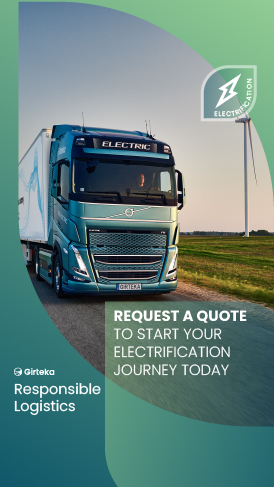There are many ways to reduce our carbon footprint, especially in transportation. We can choose either more eco-friendly transports like buses, trains, bicycles or less emitting cars like electric or hybrid. But we all know that the logistics sector must also address those issues with certain decisions and initiatives to secure proper and relevant efficiency in reducing CO2 emissions. This is one of the main goals of the 8th edition of Girtekas ECO League.
Scale makes a difference
Imagine milions of trucks on the road in Europe driving every day. And what if all the drivers are going to focus on driving more eco, reducing more CO2 emissions? With that scale, it is a significant impact on our emissions. The European transport sector is responsible for approximately 25% of total emissions in the EU. Road transportation itself covers 71% of those emissions. That means if we can reduce emissions in each car, bus, and truck by 20%, we get approximately 4% of total emissions reduced in the EU. But how to do that?
With more than 9.000 trucks, Girteka, the European largest asset-based road transportation company, defines reduction of emissions as one of the key strategic elements in terms of developing responsible logistics of the future. By investing in the fleet (average age less than 2 years old), and focusing on drivers’ behaviours on the road with different initiatives, Girteka is making a huge step towards more clean and sustainable logistics. One of them is ECO League, a contest for drivers to compete on the most eco-driving skills.
“Being a leader in the market is also a responsibility. Not only for our customers, their cargo, employees, and shareholders but for everyone on the road and aside from it. With our expanding fleet, the crucial part is how to influence emissions, as the scale has an enormous potential to achieve. With exchange every 2 years, trucks can provide a tangible and noticeable change in CO2 reduction,” expressed Mindaugas Paulauskas, CEO Girteka Transport.
With a focus on safety
Focusing on eco-driving has many benefits. One of the key additional benefits is increased safety on the road and around it. Securing safety is crucial when you talk about roads in Europe, where in 2021 there were 5% more fatal accidents than in 2020.
With ECO League truck drivers are also learning how to avoid accidents, how predict situations on the road, take care of themselves and other participants on the road, and safely deliver the cargo. With such intense traffic all around European roads, safety issues affect the effectiveness of supply chains and the economy itself.
“Our drivers must first accomplish annual training, divided into theoretical and practical sessions. The theoretical part is two hours long and an instructor explains the principles of safe and economical driving. After the theoretical part, drivers are taken to the practical part, where they test everything they have learned while driving a truck on our specifically designed route,” explained Paulauskas.
Competition with a greater goal
“Drive smart and safe! – this is the main objective and goal of the motivational initiative for economical and environmentally friendly driving in Girteka named ECO League. Integrating a culture of economical driving which makes the best use of advanced vehicle technology and at the same time improves road safety, not only develops the driving skills of drivers but also fosters a more responsible driving style and reduces vehicle operating costs,” said Paulauskas.
In Girteka’s ECO League driving is analyzed through 8 different parameters from idling, use of brakes and extreme braking, stops, rolling and cruise control usage, and its effectiveness and engine load. A combination of these parameters results in an Eco score, which is measured up to the best possible result with a value of 100. This year’s first season of ECO League involved almost 18.000 drivers and the competition was tough. The winner, Pavlo Diachuk, scored 98,60 and was ahead of his colleagues only by 2 points.
With this kind of initiative transport sector can not only reduce emissions and influence the safety on the road but also lead by example in becoming more sustainable and responsible logistics.
Digitally sustainable solutions
Managing a fleet of more than 9000 trucks needs automated and sophisticated digital solutions that allow monitoring and collecting all data. With such an amount of information, the possibilities in simulation and real investigation results are enormous. Simulations can be valuable information on how to plan your supply chain both environmentally and economically. And by addressing small changes in everyday behaviour there is an impact on overall results from a company perspective.
“This valuable information can be used by companies cooperating with Girteka. More and more customers are willing to check their carbon footprint and reduce their influence on the environment. Also, those kinds of information are often used with ESG reporting, which is going to be mandatory in the upcoming years. So how we reduce our impact on the environment sometimes is driven by small steps in everyday life and work,” summarized Paulauskas.





